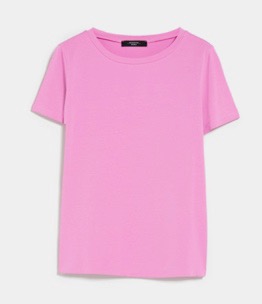- Pamela Tucker

- Sep 19, 2023
- 3 min read
Updated: Jan 28, 2024
The d’Orsay / D’Orsay style shoe is one of my favorite shoe styles, especially those with pointed toes and a high heels.
The d'Orsday style is a shoe that is carved out around the arch and shows more of the foot when compared with typical pumps or flats that wrap around closer to the foot. Some brands refer to shoes with just one side cut out as being the d'Orsday style.
An example of the one side cut out, and described on its website as such is the Christian Louboutin shoe shown here. This outstanding shoe, ($995) adorned with mini spikes is called Vidura, one of the styles in the brand's new collection. When I checked for this shoe on January 28, 2024 it was no longer available on the brand site. Yet, the one side cut out pump style is available under different style names. The one shown here is called Iriza 85MM Satin D'Orsay Pumps. This is the link to the shoes priced at $845 available at Saks Fifth Avenue: http://tinyurl.com/3pdr47uk

In recent years it has been difficult finding d'Orsays. The good news, based on my in-store and online searches in recent weeks is this style is becoming a little easier to find. It is great seeing the uptick in the availability of this style and would like to see more.
Below are some of the d'Orsay shoes I've located, ranging from flats to stiletto high heels and this style is also available across a range of price points.
Gianvito Rossi
Something Bleu
Zara
Vince
Gianvito Rossi's black d'Orsay pointed toe pump, with a heel about four inches high, shown here and named Karina is a gorgeous shoe! The company's website states: "The front is embellished with an oversize rose with metallic zip detail trim." Gianvito Rossi's website shows it is available only in black. https://tinyurl.com/2p99wurs Update: Noted on January 28, 2024 the price is reduced from $1,195 to $717.

Bergdorf Goodman had Karina in a gorgeous shade of red. However, when I looked at the Bergdorf Goodman website today, January 28, 2024 it no lo longer listed. I could see it being a hot item and it sold out!

The brand, Something Bleu on the
buttershoes.com website has beautiful kitten heel d'Orsay shoes for special occasions. If shades of Barbie are still on your mind, or if looking for a perfectly hot pink satin shoe, adorned with some glitter this could be the right choice. The style, Darla, ($375) has a heel of about 1.5 inches. For a better look at these shoes, refer to this link: https://tinyurl.com/yu64zc58 Note these shoes are available in other colors such as black and ivory. The Something Bleu brand, which has other pretty styles is also available at Nordstrom and Neiman Marcus.

With metallics now a fashion must have, Zara's gold kitten heel pumps ($49.90 when post was originally published. As of January 28, 2024 the price is $15.99) are a stylish pair to consider. For those fearing metallic clothes are too much to wear, a metallic shoe is an option to be in step with the metallic trend. Click here to see them on the website: https://tinyurl.com/5ycheffs
Of note, the Zara website does not mention d'Orsay when describing these shoes. Searching the Zara website using the word d'Orsay reveals zero results.
Zara is not alone with not using the word d'Orsay to describe shoes that are d'Orsays. For instance, on the Giorgio Armani website there is a lovely d'Orsay pair that is a pleated nappa leather high heel pump. The price is $1,095

The website does not mention it is the d'Orsay style. Check out these striking shoes here:https://tinyurl.com/5a9fhd75
Vince has been one of my favorite go to clothing brands for about a decade and have written about Vince in previous posts. I'm drawn to Vince's basic, yet thoughtful designs and fit, along with their feel good fabrics: cashmere, silk and pima cotton. I've also worn
Vince shoes. In fact two of my favorite pairs, both pointed toed high heels were d'Orsays. Purchased about eight - nine years ago the two styles Celeste (black suede) and Claire (black leather) were perfect pumps. I wore them out. Parting with comfortable high heels were sad days! These two styles would be perfect candidates to be evergreen products in the Vince shoes line-up.

While perusing the Vince website last month it was great seeing an addition to the shoes section-- a pair of black leather pointed toe d'Orsay heels. The style, ($350 and as of January 28, 2024 listed for $245) with a wide stacked heel over three and a half inches is called Prim. Check these out here: https://tinyurl.com/2psxyp2m
I'm glad shoe brands are including d'Orsay styles and some are adding them to their offerings. It is a step in the right direction and hoping to see more!











